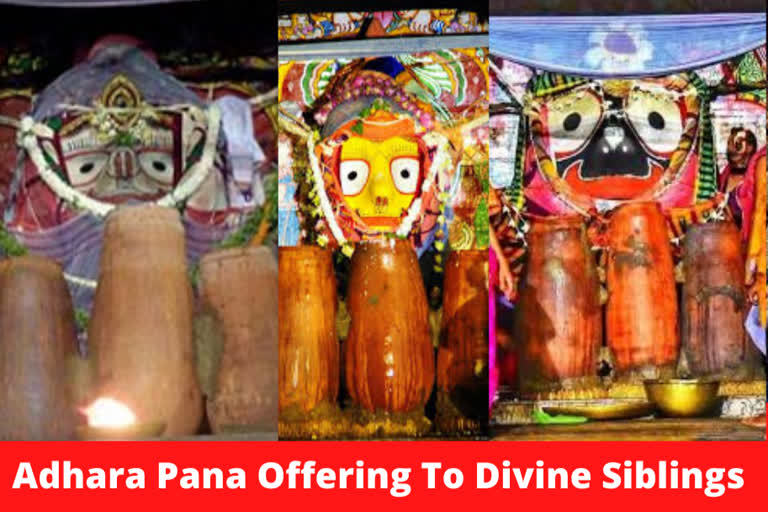Puri: A day after Suna Besha, when the sibling deities glittered in golden attire, huge pots filled with a sweet drink are carried onto the three chariots as offerings.
This interesting ritual of Adhara Pana, which literally translates as Adhara – Lip and Pana – Juice, is performed on the 12th day of the bright fortnight of the month of Asadha.
During the ritual, the terracotta pots are placed on each chariot parked near the Lion Gate’s of the 12th-century shrine. These reach up to the Lords’ lips.
The pots contain 100 litres of a mixture of milk cream, cheese, sugar, banana, camphor, nutmeg, black pepper and other such spices. These are then broken to liberate the souls/spirits and other invisible beings residing in the chariots.
This sweet flavoured milk-based drink is offered to the deities in nine large barrel-shaped earthen pitchers atop the chariots (three on each chariot) after completion of “sodasha upachara pooja”.
ALSO READ: Suna Besha: When holy Trinity adorned with gold ornaments in chariots
As per the tradition, Shree Jagannath Temple Administration and the authorities of Raghab Das Mutt and Badaodia Mutt arrange the clay pots from local potters, who use three sacks of fine soil and a sack of sand to make these. It takes them at least a month to shape three special clay pots for the ritual.
Many believe that the refreshing drink cools the limbs of the Lords after a tiring journey on chariots and the subsequent Suna Besha ritual. Each pitcher measures approximately one metre in height which touches the lips of the deities hence the name Adhara Pana.
In a special interaction with ETV Bharat, a scholar of Jagannath culture, Achyutananda DasMohapatra said," This ritual of ‘Adharapana’ on the chariots of the deities is performed on the thirteenth day of the bright lunar fortnight of the Odia month of ‘Ashadha’. For these three high earthen pots of the height of the deities up to their lower lips are made and kept ready for the ritual. Since these earthen pots containing the “Pana” (syrup) touches the lower lips (Adhara) of the deities, it is called offering of ‘Adharapana’. This offering of the syrup is a very important ritual and is full of mysterious truths. The legend behind this is also mysterious."
ALSO READ: Alarnath Temple: The Lord’s temporary abode
"A total of nine earthen pots, three for each deity, are kept ready for the preparation of the syrup. The ‘Pania apata’ servitors (those who carry water) after putting masks on their faces bring water from the well of “Chauni Matha” (a hermitage) located in front of the main gate of the grand temple. After the water is filtered, the same is kept in large-sized brass pots. Thereafter the cook servitors of the Lord will prepare the syrup. From a mixture of unrefined sugar, milk, milk cream, cheese, refined molasses, ripe bananas, pepper powder, camphor and Muristica fragrance, the syrup is prepared," he said.
The servitors offer the said drink to the deities. After the offering of “pana” to the deities on the chariots, the servitors smash the earthen pitchers.
As per the ritual, the Adhara Pana is not for the devotees and servitors but it is only for these evil spirits and the minor deities present on the three chariots (Parsva Devatas) to guard the chariots during Ratha Yatra.
The smashing of these earthen pots on the chariots is purposefully done because the drink is not for the consumption by the devotees and also to ensure that all these invisible forces and Parsva Devatas consume the Adhara Pana and get satisfied.
READ:| Goddess Bata Mangala, who showed path to Lord Brahma to Jagannath temple



